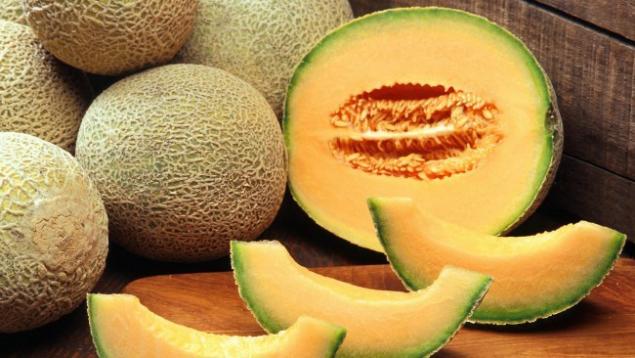489
Melon prevents the deterioration of vision with age
Musk melon (cantaloupe or melon) belongs to the family Cucurbitaceae (Cucurbitaceae) is a close relative of squash and cucumbers. Like its sister pumpkin and cucumber, the melon plant is a vine spreading on the soil surface. It is believed that it originates from India, Ancient Persia or Africa. Prefers well-drained sandy soil with good irrigation. For pollination, the melon needed honeybees.
Like mango and protects the skin from UV rays watermelon, melons are summer season fruits. Cultivated several varieties of cantaloupe. European cantaloupe (Cucumis melo cantalupensis) derives its name from the Pope's summer residence "Cantalup" and has a slightly ribbed pale skin with a greenish tint.

The North American cantaloupe (Cucumis melo reticulatus), common in the USA and some areas of Canada, named "reticulatus" ("net") because of its as if covered with a mesh skin. Honey melons have a sweet and juicy pulp is a pale green color. On resource Nutrition And You talked about that melon is not only delicious, but also very useful.
Usually, the melon reaches 11.5, and 16.5 cm in diameter and weight from 450 to 850 grams, but often melon and can weigh more than a kilogram. The colour of its flesh varies from orange-yellow to pinkish. Melon pulp is characterized by a soft consistency and juicy texture. She tasted sweet and has a musky aroma, fully manifested in fully ripe fruits. In the center of the fruit is a cavity in which are small whitish seeds, United viscous "network".
Store melons should be in a cool well-ventilated place. Sliced melon should be stored in the refrigerator.
The benefits of melon for health
Cantaloupe is not only delicious, but also useful. First of all, it is very low in calories (34 calories per 100 grams). It is also characterized by low content of fat. The fruit with the melon is rich in numerous restorative health polyphenolic compounds of plant origin, vitamins and minerals.
Cantaloupe — a great source of vitamin A (100 grams contains 3382 international units, or 112% of the recommended daily consumption of this vitamin). The level of its content in musk melon is one of the highest among all members of the gourd family. Vitamin a is a powerful antioxidant and is essential for vision. It is also necessary to maintain healthy skin and mucous membranes. Eating fruits rich in vitamin A, is a certain protection against lung cancer and oral cavity.
Rich musky melon also and antioxidant flavonoids, including beta-carotene, zeaxanthin and cryptoxanthin. These antioxidants help to protect cells and other structures in the body from oxygen free radicals, prevent cancers of the colon, breast, endometrial, lung and pancreas.
Total antioxidant ORAC indicator of musk melons is 315 µmol TE / 100 grams. Antioxidant indicator honeydew melon is 241 µmol TE / 100 grams.
Zeaxanthin is an important dietary carotenoid, selectively absorbed by the yellow spot of the retina, which acts as an antioxidant and provides protection from UV rays. Thus, it helps to prevent age-related macular degeneration.
In musk melons in moderation contains the electrolyte potassium — 267 milligrams per 100 grams. Potassium is an important component fluids of the cells and organism, helps control heart rate and blood pressure. It is to a certain extent contributes to the prevention of stroke and coronary heart disease. Cantaloupes contain vitamins of the B complex (including Niacin and Pantothenic acid) and vitamin C and essential mineral manganese, but also in moderation.
Caution
Science has known cases of allergic reactions to cantaloupe, so it is believed that it may be consumed during pregnancy or nursing. In this case, since the melons belong to the Cucurbitaceae, they may contain the toxin kukurbitatsin. For this reason, you should avoid eating unripe or bitter melon. The surface of the melon can be infected by the malicious bacteria — Salmonella, especially in areas of minor cracks and cuts. Therefore, before eating the melon should be thoroughly washed under cold running water.
Nutritional value of cantaloupe
In parentheses are the percentage of the daily allowance. Nutritional value is based on 100 grams of cantaloupe (Cucumis melo) according to information from the Ministry of agriculture of the USA, shown in the resource Nutrition And You.
General information:
energy value — 34 kilocalories (1,5%);
carbohydrates 8.6 grams (6,5%);
protein — 0.84 grams (1,5%);
fat and 0.19 grams (<1%);
fiber, part of the food — 0.9 grams (2.25 per cent).
Vitamins:
folic acid (vitamin B9) — 21 micrograms (5%);
nicotinic acid (vitamin B3) — 0,734 milligrams (4,5%);
Pantothenic acid — 0,105 milligrams (2%);
pyridoxine (vitamin B6) — 0,072 mg (5,5%);
Riboflavin (vitamin B2) — 0,026 mg (2%);
thiamine (vitamin B1) is 0.017 mg (1%);
vitamin a, which very much is contained in dandelion — 3382 international units (IU, IU) is 112%;
vitamin C — 36.7 mg (61%);
vitamin E — 0,05 mg (0,5%);
vitamin K, an incredibly rich source of which is sage — 2,5 micrograms (2%).
Electrolytes:
sodium — 1 milligram (~0%);
potassium 267 mg (6%).
Minerals:
calcium — 9 mg (1%);
copper — 41 micrograms (or 4.5%);
iron 0.21 mg (2,5%);
magnesium — 12 milligrams (3%);
manganese — 0.041 milligram (2%);
zinc — 0.18 mg (1,5%).
Phytonutrients:
alpha-carotene (α-carotene) — 2020 micrograms;
beta-carotene (ß-carotene), which is rich in carrots — 1 micrograms;
lutein-zeaxanthin — 26 micrograms. published
P. S. And remember, only by changing their consumption — together we change the world! ©
Source: hi-news.ru
Like mango and protects the skin from UV rays watermelon, melons are summer season fruits. Cultivated several varieties of cantaloupe. European cantaloupe (Cucumis melo cantalupensis) derives its name from the Pope's summer residence "Cantalup" and has a slightly ribbed pale skin with a greenish tint.

The North American cantaloupe (Cucumis melo reticulatus), common in the USA and some areas of Canada, named "reticulatus" ("net") because of its as if covered with a mesh skin. Honey melons have a sweet and juicy pulp is a pale green color. On resource Nutrition And You talked about that melon is not only delicious, but also very useful.
Usually, the melon reaches 11.5, and 16.5 cm in diameter and weight from 450 to 850 grams, but often melon and can weigh more than a kilogram. The colour of its flesh varies from orange-yellow to pinkish. Melon pulp is characterized by a soft consistency and juicy texture. She tasted sweet and has a musky aroma, fully manifested in fully ripe fruits. In the center of the fruit is a cavity in which are small whitish seeds, United viscous "network".
Store melons should be in a cool well-ventilated place. Sliced melon should be stored in the refrigerator.
The benefits of melon for health
Cantaloupe is not only delicious, but also useful. First of all, it is very low in calories (34 calories per 100 grams). It is also characterized by low content of fat. The fruit with the melon is rich in numerous restorative health polyphenolic compounds of plant origin, vitamins and minerals.
Cantaloupe — a great source of vitamin A (100 grams contains 3382 international units, or 112% of the recommended daily consumption of this vitamin). The level of its content in musk melon is one of the highest among all members of the gourd family. Vitamin a is a powerful antioxidant and is essential for vision. It is also necessary to maintain healthy skin and mucous membranes. Eating fruits rich in vitamin A, is a certain protection against lung cancer and oral cavity.
Rich musky melon also and antioxidant flavonoids, including beta-carotene, zeaxanthin and cryptoxanthin. These antioxidants help to protect cells and other structures in the body from oxygen free radicals, prevent cancers of the colon, breast, endometrial, lung and pancreas.
Total antioxidant ORAC indicator of musk melons is 315 µmol TE / 100 grams. Antioxidant indicator honeydew melon is 241 µmol TE / 100 grams.
Zeaxanthin is an important dietary carotenoid, selectively absorbed by the yellow spot of the retina, which acts as an antioxidant and provides protection from UV rays. Thus, it helps to prevent age-related macular degeneration.
In musk melons in moderation contains the electrolyte potassium — 267 milligrams per 100 grams. Potassium is an important component fluids of the cells and organism, helps control heart rate and blood pressure. It is to a certain extent contributes to the prevention of stroke and coronary heart disease. Cantaloupes contain vitamins of the B complex (including Niacin and Pantothenic acid) and vitamin C and essential mineral manganese, but also in moderation.
Caution
Science has known cases of allergic reactions to cantaloupe, so it is believed that it may be consumed during pregnancy or nursing. In this case, since the melons belong to the Cucurbitaceae, they may contain the toxin kukurbitatsin. For this reason, you should avoid eating unripe or bitter melon. The surface of the melon can be infected by the malicious bacteria — Salmonella, especially in areas of minor cracks and cuts. Therefore, before eating the melon should be thoroughly washed under cold running water.
Nutritional value of cantaloupe
In parentheses are the percentage of the daily allowance. Nutritional value is based on 100 grams of cantaloupe (Cucumis melo) according to information from the Ministry of agriculture of the USA, shown in the resource Nutrition And You.
General information:
energy value — 34 kilocalories (1,5%);
carbohydrates 8.6 grams (6,5%);
protein — 0.84 grams (1,5%);
fat and 0.19 grams (<1%);
fiber, part of the food — 0.9 grams (2.25 per cent).
Vitamins:
folic acid (vitamin B9) — 21 micrograms (5%);
nicotinic acid (vitamin B3) — 0,734 milligrams (4,5%);
Pantothenic acid — 0,105 milligrams (2%);
pyridoxine (vitamin B6) — 0,072 mg (5,5%);
Riboflavin (vitamin B2) — 0,026 mg (2%);
thiamine (vitamin B1) is 0.017 mg (1%);
vitamin a, which very much is contained in dandelion — 3382 international units (IU, IU) is 112%;
vitamin C — 36.7 mg (61%);
vitamin E — 0,05 mg (0,5%);
vitamin K, an incredibly rich source of which is sage — 2,5 micrograms (2%).
Electrolytes:
sodium — 1 milligram (~0%);
potassium 267 mg (6%).
Minerals:
calcium — 9 mg (1%);
copper — 41 micrograms (or 4.5%);
iron 0.21 mg (2,5%);
magnesium — 12 milligrams (3%);
manganese — 0.041 milligram (2%);
zinc — 0.18 mg (1,5%).
Phytonutrients:
alpha-carotene (α-carotene) — 2020 micrograms;
beta-carotene (ß-carotene), which is rich in carrots — 1 micrograms;
lutein-zeaxanthin — 26 micrograms. published
P. S. And remember, only by changing their consumption — together we change the world! ©
Source: hi-news.ru























